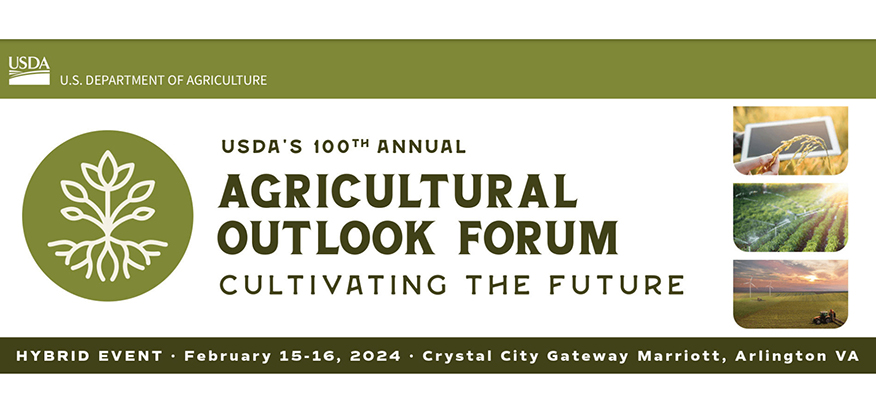Encouraging farmers to use biotech and other climate tech to make agriculture more sustainable requires ensuring that their impact on climate is measured accurately and remunerated appropriately, said participants on the Feb. 15 opening day of the U.S. Department of Agriculture (USDA) 100th Annual Agricultural Outlook Forum.
USDA is helping farmers turn efforts at sustainability into a means of income that can supplement the money they make from raising crops or livestock, U.S. Agriculture Secretary Tom Vilsack said in his keynote.
“It’s not that we are excluding production in agriculture, it’s that we think we can do something in addition. It’s not subtraction; it’s an addition,” said Vilsack. “So, we’re not just selling a commodity. We’re now selling an environmental result.”
A century old as of this year, the annual USDA Agricultural Outlook Forum highlights USDA’s reports of the past year’s production and the state of the farming sector. However, it is also very much about the future outlook. Many discussions and panels in the Feb. 15-16 event focused on innovation.
USDA Agricultural Outlook Forum highlights importance of data
Vilsack said USDA is encouraging innovation for climate through programs like their Partnership for Climate Smart Commodities. The partnership is investing $3 billion in 141 projects involving 205 climate practices. Vilsack said it’s important that the climate-friendly practices are voluntary, and encouraged by incentives, rather than by requirements. Farmers will adopt practices that benefit the climate, but the transition will have a greater impact if it is voluntary, he said.
Innovation for climate was the topic of a panel held shortly after Vilsack’s keynote at the USDA Agricultural Outlook Forum. Panelists said the key to taking advantage of climate tech is to obtain meaningful data that can outline the real benefits of the technology. That not only helps farmers take the most sustainable actions but also allows farms of all sizes to participate in carbon markets. This creates new value for farmers while helping the environment.
“If you can measure it, you can treasure it, said Paul Bloom, Chief Carbon Officer and Chief Innovation Officer of Gevo. “Data is important because you can’t create high-quality carbon accounting without high-quality data. The good news is most of that data exists.”
The data just needs to be put to work.
SAFs: A ‘whole new industry’
Gevo makes sustainable aviation fuel (SAF). Bloom said that measuring the real value of SAFs involves accounting for the farming practices that produce the feedstock, from production to processing and delivery to the consumer.
“We’re focusing on how we deliver not just net zero, but potentially net negative biofuel,” which can “drop into existing equipment so you don’t have to recapitalize,” Bloom said. “You can use the existing aircraft, you can use the existing diesel engine, you can use the existing gasoline engine that you already have.”
According to Vilsack, SAFs are a great example of “creating whole new industries” that turn sustainable practices into a source of income.
“Thirty-six-billion gallons of fuel has to be produced for the airline industry that is desperate for this fuel. Why? Because we’re not going to have battery-powered planes. We’re not going to have hydrogen-powered planes for a considerable period of time. But it is important for United and Southwest and Delta and American and all of the airlines to be able to use a low carbon fuel,” Vilsack said.
Incentives in the Inflation Reduction Act (IRA) are helping to create the infrastructure to use a wide range of feedstocks and boost biofuels. This can ensure that “American agriculture will be front and center in providing that fuel,” Vilsack said.
The USDA Agricultural Outlook Forum continues on Feb. 16. Register here to participate online.




